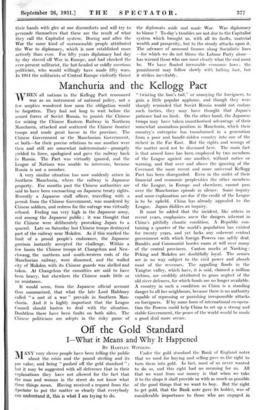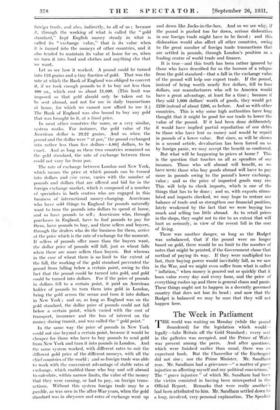Off the Gold Standard
I—What it Means and Why It Happened
BY HARTLEY WITHERS.
MANY very clever people have been telling the public about the crisis and the pound sterling and its par value, and being " pushed off the gold standard " ; but it may be suggested with all deference that in their explanations they have not allowed for the fact that the man and woman in the street do not know what these things mean. Having received a request from the Spectator to put the matter so clearly that everybody can understand it, this is what I am trying to do. Under the gold standard the Bank of England notes that we used for buying and selling gave us the right to turn them into gold. In fact, most of us never wanted to do so, and this right had no meaning for us. All that we want from our money is that when we take it to the shops it shall provide us with as much as possible of the good things that we want to buy. But the right to get gold, that the Bank note gave its holder, was of considerable importance to those who are engaged in foreign trade, and also, indirectly, to all of us ; because it, through the working of what is called the " gold' standard," kept English money steady in what is called its " exchange value," - that is its value when it is turned into the moneys of other countries, and it also tended to maintain its value at home for us, when we turn it into food and clothes and anything else that we want.
Let us see how it worked. A pound could be turned into 113 grains and a tiny fraction of gold. That was the rate at which the Bank of England was obliged to convert it, if we took enough pounds to it to buy not less than 400 oz., which cost us about £1,600. (This limit was imposed so that gold should only be taken out to he sent abroad, and not for use in daily transactions at home, for which we cannot now afford to use it.) The Bank of England was also bound to buy any gold that was brought to it, at a fixed price.
In most other countries the same, or a very similar, system works. For instance, the gold value of the American dollar is 23.22 grains. And so when the pound and the dollar were " at par," the pound exchanged into rather less than five dollars-4.861 dollars, to be exact. And as long as these two countries remained on the gold standard, the rate of exchange between them could not vary far from par.
The rate of exchange between London and New York, which means the price at which pounds can be turned into dollars and vice versa, varies with the number of pounds_ and dollars that are offered and bid for in the foreign exchange market, which is composed of a number of specialists in both centres who are engaged in this business of international money-changing. Americans who have sold things to England for pounds naturally want to turn the pounds into dollars to spend at home, and so have pounds to sell ; Americans who, through purchases in England, have to find pounds to pay for them, have pounds to buy, and these sellers and buyers, through the dealers who do the business for them, arrive at the price which is the rate of exchange for the moment. If sellers of pounds offer more than the buyers want, the dollar price of pounds will fall, just as wheat falls when there are more sellers than buyers. But whereas in the case of wheat there is no limit to the extent of the fall, the working of the gold standard prevented the pound from falling below a certain point, owing to this fact that the pound could be turned into gold, and gold could he turned into dollars. For if the price of pounds in dollars fell to a certain point, it paid an American holder of pounds to turn them into gold in London, bring the gold across the ocean and turn it into dollars in New York ; and so, as long as England was on the gold standard, the dollar price of pounds could not fall below a certain point, which varied With the cost of transport, insurance and the loss of interest on the money during transit, and was called the " gold point."
In the same way the price of pounds in New York could not rise beyond a certain point, because it would be cheaper for those who have to buy pounds to send gold from New York and turn it into pounds in London. And the same system worked, with different rates to suit the different gold price of the different moneys, with all the chief countries of the world ; and so foreign trade was able to work with the _convenient advantage of stable rates of exchange, which enabled those who buy and sell abroad to calculate, within narrow limits, the value of the money that they were earning, or had to pay, on foreign trans actions. Without this system .foreign trade may be a gamble, as was seen in the after-War years, when the gold standard' was in abeyance and rates of exchange went up and down like Jacks-in-the-box. And so we see why, if the pound is pushed too far down, serious dislocation in our foreign trade might have to be faced ; and this dislocation would also affect all other countries, owing to the great number of foreign trade transactions that are settled in pounds, through London's position as a leading centre of world trade and finance.
It is true—and this truth has been rather ignored by those who have described for us the horrors of a relapse from the gold standard—that a fall in the exchange value of the pound will help our export trade. If the pound, instead of being worth nearly five dollars, fell to four dollars, our manufacturers who sell to America would have a great advantage, at least for a time ; because if they sold 1,000 dollars' worth of goods, they would get £250 instead of about £206, as before. And so with other countries. This is why some high authorities have long thought that it might be good for our trade to lower the value of the pound. If it had been done deliberately it would have implied partial repudiation of our debts to those who have lent us money and would be repaid in pounds of a lower value. But since, as will be shown in a second article, devaluation has been forced on us by foreign panic, we may accept the benefit so 'conferred.
But what will be happening to prices at home ? This is the question that touches us all as' spenders of our incomes. Those who sell abroad will benefit, as we have seen; those who buy goods abroad will have to pay More in pounds owing to the pound's lower exchange. value ; and so the price of imported goods may rise This will help to check importS, which is one of the things that has to be done ; and so, with exports stimu- lated and imports checked, we may hope to restore our balance of trade and so strengthen our financial position, lately weakened by the fact that we were buying too much and selling too little abroad. As to retail prices in the shops, they ought not to rise to an extent that will hurt us seriously, in view of the recent fall in the cost of living.
There was another danger, so long as the Budget was unbalanced, that if the pound were no longer based on gold, there would be no limit to the number of notes that might be printed, if the Government chose that method of paying its way. If they were multiplied too fast, their buying power would inevitably fall, as we saw in the War, and we might even suffer from what is called " inflation," when money is poured out so quickly that it loses value every day and every hour, and the price of everything rushes up and there is general chaos and panic. These things ought not to happen in a decently governed country that does not lose its head ; and now that the Budget is balanced we may be sure that they will not happen here.



































 Previous page
Previous page